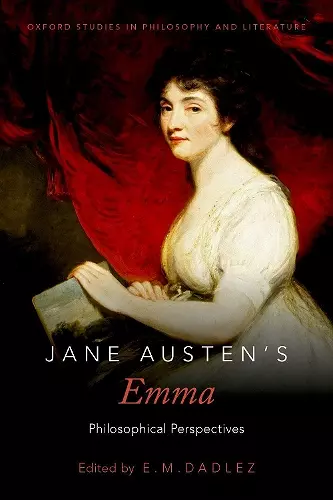Jane Austen's Emma
Philosophical Perspectives
Format:Hardback
Publisher:Oxford University Press Inc
Published:29th Nov '18
Currently unavailable, and unfortunately no date known when it will be back
This hardback is available in another edition too:
- Paperback£25.99(9780190689421)

What has Emma Woodhouse, "handsome, clever, and rich, with a comfortable home and very little to distress or vex her" to say to a discipline like philosophy? How is a novel like Emma, inaccurately but not infrequently caricatured as a high-toned version of a pedestrian romance, to supply material for philosophical insight or speculation? Jane Austen's Emma is many things to many readers but it is as inaccurate as it is reductive to consider it just a romance. The minutia of daily living on which it concentrates permit not a rehearsal of platitudes, but a closer look at human emotions and motives, as well as the opportunity to hone our interpretive and empathetic skills. Emma flies in the face of conventional notions of femininity by presenting a heroine with hubris. It shows how friendships can affect one's ways of dealing with the world, how shame can reconfigure self-understanding, how gossip functions in sustaining a community. Emma rehabilitates conceptions of romance by rejecting melodrama in favor of naturalism. It explores the waywardness of the imagination and the myriad ways in which different people with different biases and agendas may evaluate the same evidence. It dwells on the limits of autonomy in that it explores the ease with which one may submit to the will of another. Emma is not itself a work of philosophy. Rather, it leads us to think philosophically. In this volume, a myriad group of scholars and philosophers explore the philosophical resonances of Emma.
What distinguishes this anthology is that it connects Jane Austen's literary masterpiece to a number of classical and contemporary philosophical texts and viewpoints. The result is a fresh set of insights into a novel whose textual ambiguities have met with wide disagreement among literary critics over how to make sense of the many subtleties Austen has woven into her literary tapestry. An equally penetrating critical spirit extends toward the philosophy side. And not just because literary works frequently convey complex narrative situations that enrich the store of truncated examples more abstract works of philosophy are able to provide. But also because literary presentations themselves often presuppose philosophical views... * Ira Newman, The Journal of Aesthetics and Art Criticism *
ISBN: 9780190689414
Dimensions: 145mm x 211mm x 18mm
Weight: 420g
264 pages